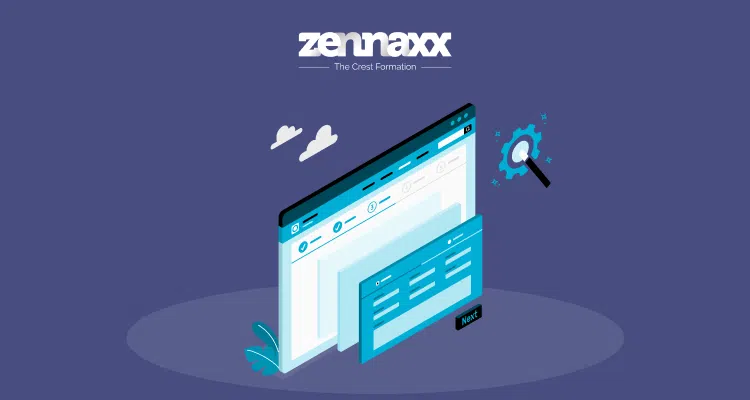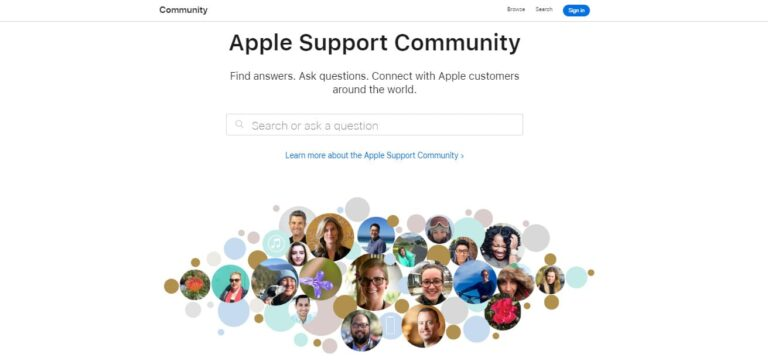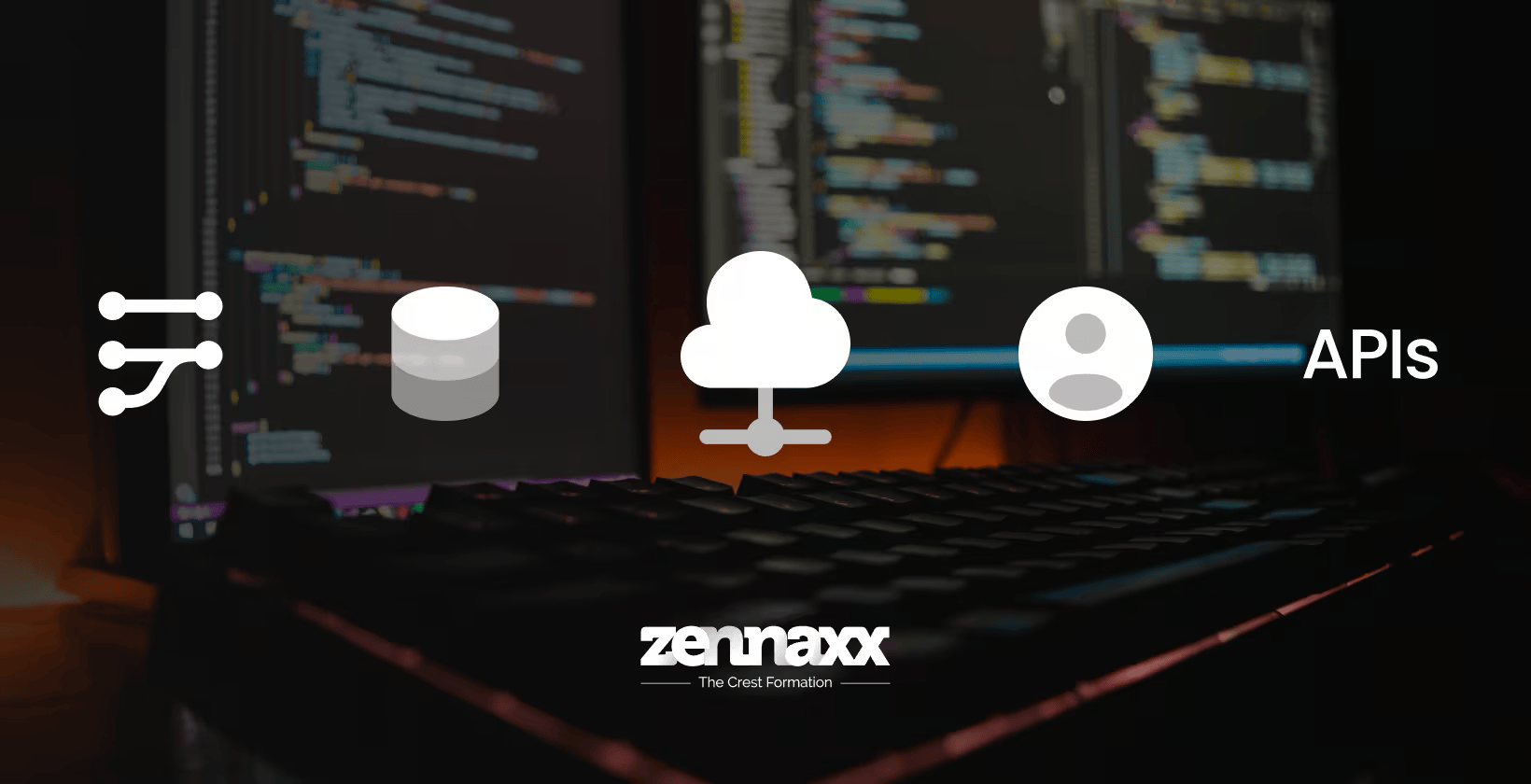This article helps you with twelve key types of web portals you can build for your business with benefits.

Different Types of Web Portals
1. Customer Portal
The customer portal is a dedicated platform where users can manage relationships with your brand. It is most common type of web portal.
Key benefits of a customer web portal are,
- Customers can update their personal information on customer portals, track queries, and manage subscriptions.
- It acts as a self-service platform for customers to easily manage profiles, accounts, passwords, and payments and get answers to specific queries.
- Customer portals are crucial for brands because they help reduce response time.
- It also allows brands to personalize interactions and content for the target audience.
- Customer portals also help businesses streamline support activities for their clients.

Apple’s community portal is a classic example of a customer portal. It is a forum-based portal that allows customers to ask queries and get answers instantly from others on the platform. It is most famous type of web portal.
Integrating AI-based chatbots can help you build customer portals that automate most user interactions. However, whether you use chatbots or not, getting the basics of your customer portal right is crucial.
For example, adding FAQs is essential and pivotal for customer experience. A Salesforce report indicates that 39% of millennials check FAQs before interacting with a brand, indicating the importance of self-service resources.
2. Corporate Portal
Some of the key benefits of a corporate portal for your company are,
- It is a centralized repository for all your business information that employees need.
- Corporate portals offer employees easy access to company information.
- It allows employees to communicate with each other seamlessly with real-time interaction features.
- Corporate portals can improve employee productivity by reducing the time needed to gather critical information.
- You can integrate corporate portals into existing systems and automate critical tasks.
Similarly, you can use many off-the-shelf corporate portal software for your business. You can even build one from scratch leveraging web portal development services.
3. Education Portal
Educational portals are your personalized coaching platforms providing access to various resources. These portals are explicitly designed to facilitate online learning.
Some of the types of educational portals that you may find are,
- Online learning platforms provide access to educational content, courses, and resources online with a focused Approach to a specific subject or discipline.
- University portals allow students to access resources and services offered by universities with the ability to interact with faculties.
- Educative portals have lesson plans, educational games, and testing materials that students can use to study.
- Professional development portals help educators and teachers upskill according to the latest innovations.
- Parents portals are the ones that allow parents of students to manage learning. It will enable parents to access lessons on student resources and schedule essential assignments.
4. Informational Portal
A classic example is tourism portals, which allow travelers to gain insight into specific areas, including famous places, their history, and more.
Some of the key benefits of using an information portal are,
- Information portals offer data on various subjects, including news articles, research papers, ebooks, case studies, and more.
- It prioritizes visual representation of the data for a better understanding of the users that access it.
- Information portals help deliver personalized images, videos, and infographics tailored to user preferences.
- Such portals enable enhanced communication through an instant messaging system that allows users to get information from their respective authorities.
5. HR Portal
Companies involved in internal human resource management activities mainly develop HR portals. These portals act as an access point for employees to get information on specific HR policies.
Some of the key benefits of an HR portal are,
- HR portals help new employees onboard quickly and efficiently with a personalized onboarding process
- It allows employees to understand the company’s values, vision, and mission through handbooks and other materials.
- HR portals also help employees understand social media policies and register complaints.
- It also helps employees track their salaries and access salary slips and performance reviews.
Ready to elevate your online presence?
Start planning your web portal today for enhanced engagement and streamlined operations!
6. eCommerce Portal
The impact of such portals is massive, with several businesses using them to go online. ECommerce sales are set to reach $7 trillion by 2027, indicating the importance of building web portals for your business.
Key benefits of eCommerce portal
- It unveils a wider market base for businesses other than the local vicinity of operation or the regional area of a specific country.
- eCommerce web portals allow clients to roam and shop at their own convenience, thus improving customer satisfaction.
- These websites help minimize the requirement of brick-and-mortar stores and other expenses like rent, electricity bills, and employees for the stores.
- It enables incorporating big data solutions for recommendation systems and marketing of products & services.
- eCommerce web portals include descriptions of products, their specifications and reviews on products, and comparison mechanisms that elevate online shopping.
7. Sales Portals
Sales portals are platforms that enable centralization of the sales activities for businesses. It is a digital platform designed to streamline the entire process of sales conversions.
Key benefits of sales web portals,
- Sales web portals are designed for modularization and customization for different sales activities
- It provides ease of integration for different in-house applications like CRM and CMS
- Sales web portals allow teams to handle dynamic content and personalize interactions
- It also helps teams manage data of leads and documentation
8. Government Portal
- Downloadable forms.
- Web-based applications for civic services.
- Directories of the public authorities.
- Grievance registration platforms.
Key benefits of government web portals
- Government portals provide instant access to forms and applications under different schemes
- Information on government policies and initiatives for the public is easily accessible through the portal
- It allows online payment for civic services that the public avails from authorities.
- Public service announcements become more efficient with such web portals.
9. Healthcare Portal
Healthcare portals act as an all-in-one solution for patients and professionals. It provides online communication between the patient and healthcare practitioners.
These portals optimize the administration of the healthcare delivery system. A key example is Electronic Health Records(EHR) portals, which enable patients to access records and communicate with physicians.
Key benefits of the healthcare web portals
- Healthcare portals offer access to personal health records
- It allows healthcare professionals to manage appointment scheduling
- Such portals provide secure messaging for patients with healthcare providers
- It improves prescription management for both patients and healthcare professionals
- Patients can leverage the smart medication tracking features of a healthcare portal
Want to Automate Your Business Process With a Software Solution?
Zennaxx, a leading software development firm in Canada, has delivered 700+ bespoke solutions spanning various industries.
10. Community Portal
Key benefits of community portals
- Such portals offer discussion forums and blogs for community members
- It also provides dedicated features for event calendars and announcements
- Connecting with different people is made easier with member directories
- Such web portals also provide resource-sharing facilities among members
11. B2B Portals
So, why are these portals so important?
Because B2B buyers are going online! 7 out of 10 B2B buyers prefer online buying, and this means developing a web portal makes sense.
Key benefits of B2B portals
- B2B web portals provide dynamic product catalogs and ordering systems
- It offers supplier and buyer directories for better collaborations
- B2B portals facilitate secure transaction processing, ensuring compliance with PCI DSS
- Such tools allow businesses to compare different software services for their operations
- It also allows businesses to find tools and equipment for their operations.
Frequently Asked Questions
- Why is a web portal proper? Which are the examples of top web portals?
- Web portals are key components that gather and organize content for specific use cases. They are best for organizations that intend to create an integrated experience of access to various services. Examples of web portals include Yahoo, MSN, and Google, which offer a plethora of services like news services, emailing, and others.
- What are the types of web portals?
- You can divide web portals into vertical and horizontal ones. Vertical portals target one industry and deliver specific content and services. Horizontal portals offer a myriad of services and intend to address a massive user base.
- What is a partner web portal?
- A partner web portal is an online environment intended for partner cooperation. It serves partners such as vendors, customers, resellers, and suppliers. Such portals consolidate communication, leads, selling, and customer service.
- Is Google an example of a web portal?
- Yes, Google is a personal web portal used for information research and browsing. It also provides email, blogs, news, and maps services. Such an approach places Google in the context of a relatively ‘flat’ resource, which provides you with various content and instruments all in one place.
- What is a vertical portal?
- Vertical web portals are a type of business that is target-oriented. They provide specific materials for the target audience. For example, if you are a healthcare organization, EHR portals help patients and professionals access health records. This is a classic example of a vertical portal.
- What are employee web portals?
- An employee web portal is an online platform that consolidates information and an organization’s resources. It improves communication and cooperation within an organization. These portals minimize friction between employees and management by clarifying policies and access to vital information.
Build a Web Portal for Your Business
If you are looking to develop a web portal for your business without all these hassles, Zennaxx can help. Get your estimate of the web portal project now.


